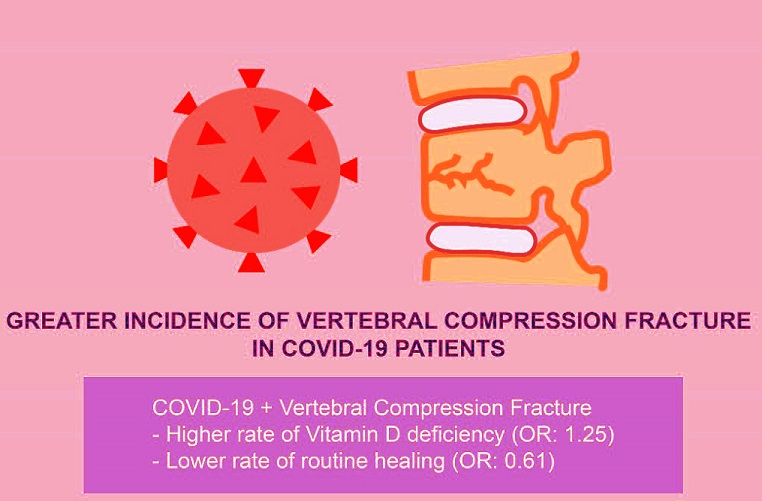American Study Finds That COVID-19 Increases Risk for Vertebral Compression Fractures
Nikhil Prasad Fact checked by:Thailand Medical News Team Dec 22, 2024 3 months, 1 day, 22 hours, 31 minutes ago
Medical News: The COVID-19 pandemic has left no corner of the healthcare system untouched. From respiratory complications to long-term effects on various organs, researchers are uncovering new layers of understanding about the virus. One of the less-explored areas has been its impact on bone health. Recent findings suggest that SARS-CoV-2, the virus responsible for COVID-19, might play a significant role in increasing the risk of vertebral compression fractures. These fractures, commonly associated with osteoporosis, can severely impact mobility and quality of life.
 Graphical Abstract: American Study Finds That COVID-19 Increases Risk for Vertebral Compression Fractures
Graphical Abstract: American Study Finds That COVID-19 Increases Risk for Vertebral Compression Fractures
Researchers from the Warren Alpert Medical School of Brown University-USA and Louisiana State University Health Sciences Center-USA recently conducted an extensive study to investigate the incidence and outcomes of vertebral compression fractures among COVID-19 patients. By analyzing data from the PearlDiver Mariner database, which includes clinical records of over 161 million patients in the United States, the team identified a significant correlation between COVID-19 and an increased risk of these fractures.
This
Medical News report delves deeper into the key findings, shedding light on how the pandemic may have aggravated bone health issues and what this means for the future of healthcare.
Study Overview and Methodology
The study spanned data collected from January 2020 to April 2022. Researchers used ICD-10 billing codes to identify adults diagnosed with osteoporotic vertebral compression fractures. They excluded patients with prior trauma, bone cancer, spinal infections, or neoplasms, ensuring that the fractures studied were primarily linked to osteoporosis and not other conditions.
Two cohorts were formed: one with patients diagnosed with COVID-19 at the time of their compression fractures and another without. Comorbidities such as obesity, vitamin D deficiency, steroid use, and diabetes were meticulously analyzed, alongside outcomes like healing patterns and additional fractures.
A staggering 413,425 cases of vertebral compression fractures were analyzed, with 23,148 patients (5.6%) having a concurrent COVID-19 diagnosis. The data revealed alarming trends in fracture incidence and recovery outcomes among COVID-19 patients.
Key Findings on COVID-19 and Bone Health
The study's results painted a complex picture. The incidence of vertebral compression fractures in COVID-19 patients was significantly higher than in those without the infection. In 2020 and 2021, the fracture rates in COVID-19 patients stood at 0.42% and 0.33%, respectively, compared to the historical average of 0.17%. This marked increase suggests a potential link between the virus and compromised bone integrity.
COVID-19 patients also exhibited higher rates of vitamin D deficiency and steroid use, both known to weaken bones. Interestingly, while osteoporosis was less common in the COVID-19 group, their healing outcomes were notably worse. Rou
tine healing occurred less frequently, with COVID-19 patients being 39% less likely to heal properly compared to their non-COVID-19 counterparts.
Furthermore, these patients were less likely to undergo surgical interventions such as kyphoplasty or vertebroplasty, potentially due to the severity of their clinical conditions.
Long-Term Implications of the Findings
The study highlights how COVID-19 might disrupt bone metabolism long after the acute phase of the infection. Patients with a history of the virus were found to have delayed healing, likely linked to persistent inflammatory responses triggered by SARS-CoV-2. Elevated inflammatory markers such as IL-6 and TNF-α, frequently observed in severe COVID-19 cases, are believed to interfere with bone repair mechanisms.
Moreover, immobilization during illness, combined with corticosteroid treatments, likely contributed to accelerated bone loss in many patients. These factors, compounded by existing vulnerabilities in older populations, created a perfect storm for increased fracture risks and poor recovery outcomes.
The Path Forward for Bone Health Surveillance
The study underscores the urgent need for proactive bone health monitoring, especially for individuals recovering from COVID-19. Healthcare providers should consider regular screenings for bone density, particularly in patients with known risk factors like vitamin D deficiency or long-term corticosteroid use. Early interventions, such as vitamin D supplementation and anti-osteoporosis therapies, could play a crucial role in mitigating long-term complications.
Additionally, addressing lifestyle factors that impact bone health - such as nutrition, physical activity, and smoking cessation - will be vital in the post-pandemic era. Enhancing awareness among healthcare professionals and the public about the hidden consequences of COVID-19 on skeletal health is also paramount.
Conclusions
This study reveals a significant association between COVID-19 and an increased incidence of vertebral compression fractures. The findings highlight the virus’s far-reaching impact on bone health, emphasizing the need for vigilance in monitoring and managing these risks. While the pandemic has strained healthcare systems worldwide, it has also opened the door to critical insights into areas like bone health, which were previously overshadowed by acute respiratory concerns.
As we move forward, integrating bone health strategies into post-COVID care plans could improve quality of life for millions of survivors. Comprehensive surveillance and targeted interventions will be essential in addressing the long-term skeletal effects of this unprecedented global crisis.
The study findings were published in the peer-reviewed: Journal of Clinical Medicine.
https://www.mdpi.com/2077-0383/13/24/7830
For the latest COVID-19 News, keep on logging to Thailand
Medical News.
Read Also:
https://www.thailandmedical.news/news/covid-19-news-sars-cov-2-infections-can-lead-to-bone-loss
https://www.thailandmedical.news/news/covid-19-weakens-bones-in-the-elderly-increasing-risk-of-fractures
https://www.thailandmedical.news/news/breaking-evidence-found-that-sars-cov-2-even-delves-into-the-skull-bones-of-those-infected
https://www.thailandmedical.news/news/breaking-sars-cov-2-targets-endothelin-receptors,-causing-bone-and-cartilage-damage-and-joint-pains-endothelin-receptor-blocker-macitentan-helps
https://www.thailandmedical.news/news/breaking-new-hong-kong-study-reveals-that-sars-cov-2-infections-also-causes-inflammatory-bone-loss-leading-to-long-covid-skeletal-health-issues
https://www.thailandmedical.news/news/dental-researchers-warn-that-covid-19-can-also-cause-osteonecrosis-of-the-jaws
https://www.thailandmedical.news/news/covid-19-news-scientists-warns-of-the-impact-of-sars-cov-2-on-the-musculoskeletal-system-and-calls-for-more-research
https://www.thailandmedical.news/news/covid-19-can-cause-osteomyelitis-of-the-jaw
